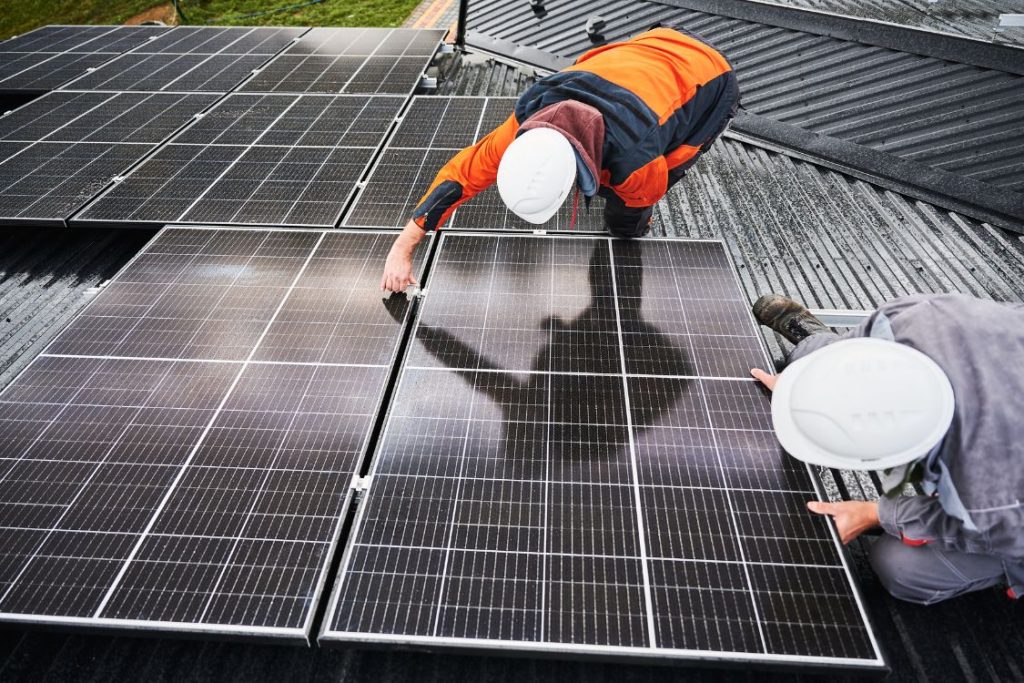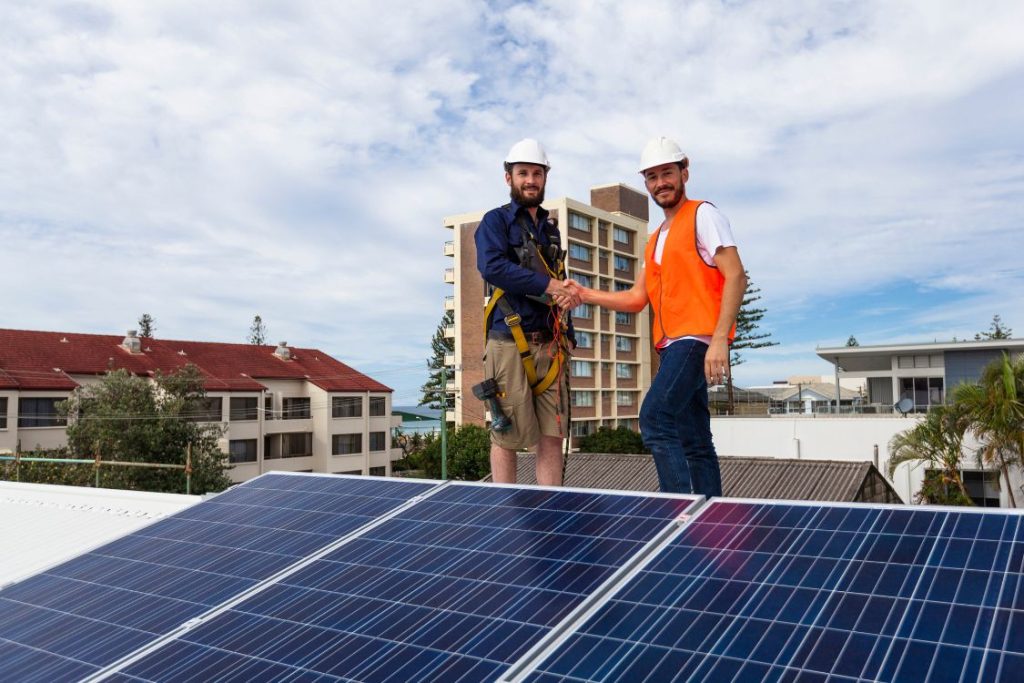Can solar panels perhaps be an unlikely hero in Scotland’s quest for energy efficiency? While the country’s famously overcast skies seem less than ideal for solar energy, the reality is that modern solar panels perform well even without direct sunlight. Solar panels in Scotland can bring about a remarkable reduction of up to 62% on electricity bills, equating to potential annual savings of £660 for an average household. This blog post will delve into how these devices can indeed maximise energy savings and efficiency, transforming the way energy is harnessed in Scottish homes.
Understanding Solar Panels in Scotland
The adoption of solar panels in Scotland is growing despite the region’s reputation for overcast skies. Solar panels remain efficient in the Scottish climate because they do not rely exclusively on direct sunlight to generate energy. This adaptability allows households to significantly reduce electricity bills, with potential savings reaching up to £660 annually, which represents a 62% reduction in costs. As a result, solar panels are becoming a viable option for many Scottish homeowners looking to cut energy expenses and contribute to sustainable living practices.
- Significant reduction in electricity bills, up to 62%.
- Contribution to eco-friendly practices by reducing carbon footprint.
- Increased energy independence for homeowners.
- Potential eligibility for government grants and incentives.
- Long-term financial savings and property value enhancement.
By harnessing solar energy, Scotland can make substantial progress towards its renewable energy targets. Solar energy offers an opportunity to diversify the energy mix and decrease reliance on fossil fuels. This transition not only supports environmental sustainability but also aligns with national goals to increase the use of renewable sources. As more households and businesses adopt solar technology, it strengthens the overall energy framework, paving the way for a cleaner and more resilient energy future in Scotland.
Costs and Savings of Solar Panels in Scotland
The initial investment in solar panel systems in Scotland can vary significantly based on system size and additional features. Generally, the cost for these systems ranges from £2,500 to £10,500 for systems sized between 3kW and 6kW. This range accounts for the price of the panels themselves, installation fees, and any necessary equipment such as inverters. The expenditure might seem substantial at first, but the long-term financial benefits often outweigh the upfront costs.
| System Size | Cost Range | Savings Potential |
| 3kW | £2,500 – £5,000 | £440 – £600 annually |
| 4kW | £5,000 – £7,500 | £600 – £800 annually |
| 6kW | £7,500 – £10,500 | £800 – £1,005 annually |
In terms of long-term savings, investing in solar panels can be highly lucrative. With annual savings ranging from £440 to £1,005, households can significantly reduce their electricity expenses. The break-even point for these investments generally falls between 8 to 9 years, depending on factors such as energy consumption patterns and system efficiency. For example, a household using a 4kW system might save approximately £700 annually, reaching the break-even point in about 9 years.
Several factors influence the overall costs of solar panel installations. The type and condition of a home’s roof can affect installation complexity and cost. Additionally, opting for battery storage to maximise energy use during non-peak sunlight hours can increase initial expenses but offers greater energy independence and savings over time. Other considerations include potential upgrades to accommodate future technology advancements, ensuring a well-rounded investment in renewable energy.
Solar Panel Installation in Scotland

The process of installing solar panels in Scotland begins with a thorough site assessment conducted by professional installers. This step involves evaluating the roof’s condition, orientation, and shading to determine optimal panel placement. Once the site is assessed, panel selection follows, tailored to the specific energy needs and budget of the homeowner. The installation itself involves securely mounting the panels, connecting the inverter, and integrating the system into the home’s electrical grid.
For a typical three-bedroom house in Scotland, a 3.5kWh system comprising about 10 solar panels is generally recommended. This configuration is designed to produce approximately 2,370 kilowatt hours annually, covering a significant portion of the household’s energy consumption. The system size and number of panels can vary based on the home’s energy needs, available roof space, and budget constraints.
Do I Need Planning Permission?
In Scotland, planning permission is typically not required for solar panel installations, provided the system adheres to certain size and positioning guidelines. Current regulations state that as long as the panels do not project more than 200mm from the roof surface and are not installed on a listed building or in a conservation area, planning permission is not necessary. It is advisable, however, to consult with local authorities to ensure compliance with all regulations.
Choosing a reputable solar installer is crucial for ensuring a successful and efficient installation. Homeowners should prioritise companies with relevant certifications, such as those accredited by the Microgeneration Certification Scheme (MCS). Additionally, reading customer reviews and seeking recommendations can provide insight into the installer’s reliability and quality of service. Taking these steps helps to safeguard the investment and maximise the benefits of solar energy.
Government Incentives and Financial Assistance for Solar Panels in Scotland
In Scotland, several government grants and financial incentives are designed to support homeowners in adopting solar energy systems. These incentives aim to reduce the initial financial burden and encourage the transition towards renewable energy. Key programmes available include the Home Energy Scotland Grant and Loan, Warmer Homes Scotland, and the ECO4 Scheme. Each programme has specific eligibility criteria, such as income thresholds or property conditions, to ensure that assistance reaches those most in need.
- Home Energy Scotland Grant and Loan: Open to all homeowners, requires a credit check and a 1.5% administrative fee.
- Warmer Homes Scotland: Targets homeowners or tenants of private landlords who have resided in their property for at least six months.
- ECO4 Scheme: Provides funding for low-income households, specifically those with an income below £31,000 or receiving certain benefits.
- Community and Renewable Energy Scheme (CARES): Assists non-profit organisations, faith groups, and charities in adopting renewable energy.
- Smart Export Guarantee: Offers rebates for exporting surplus energy back to the national grid.
Financial incentives significantly impact the affordability and appeal of solar panel installations. By subsidising initial costs, these programmes help lower the entry barriers for many homeowners. The assistance can effectively shorten the break-even period to about 8 to 9 years, making solar investments more attractive and financially viable. The reduced upfront expenditure, combined with ongoing savings on energy bills, enhances the overall return on investment for solar systems.
- Gather necessary documents, such as proof of income and property ownership.
- Contact relevant agencies through their official channels for application forms.
- Complete the application with accurate and detailed information.
- Submit the application within the specified deadlines.
- Follow up with the agency to confirm the status and any additional requirements.
Performance and Efficiency of Solar Panels in Scotland’s Climate
Solar panels in Scotland perform effectively even under overcast conditions, thanks to their ability to generate energy without the need for direct sunlight. This capability is crucial in a climate characterised by frequent cloud cover. Inverters play a key role by converting the direct current (DC) produced by the panels into alternating current (AC), which is used in homes. The efficiency of these inverters ensures that the maximum possible energy is harvested and utilised, even on cloudy days, making solar panels a reliable energy source in Scotland.
- Rain: Regular rainfall can actually help by cleaning panels, maintaining efficiency.
- Cloud Cover: Reduces energy output but panels still produce electricity, just at a lower rate.
- Temperature: Cooler temperatures are beneficial, as solar panels operate more efficiently.
- Snow: Can obstruct panels, but the angle of installation usually allows snow to slide off.
- Wind: Does not directly affect energy production, but strong winds can cause physical damage if panels are not secured properly.
To maximise solar panel efficiency in Scotland, optimal panel placement is essential. Panels should be installed at an angle that maximises sunlight exposure throughout the year. Regular maintenance, including cleaning and inspecting for damage, ensures panels operate at peak efficiency. Addressing shading issues from nearby trees or buildings can also enhance performance by allowing more sunlight to reach the panels.
Technological advancements are continuously enhancing solar panel performance, especially in regions with low sunlight. Innovations such as bifacial panels, which capture light from both sides, and improved inverter technologies are increasing the energy yield from solar systems. These developments make solar panels an increasingly viable option for energy generation in Scotland, even with its challenging weather conditions.

Final Words
Solar panels in Scotland present a promising opportunity by significantly reducing electricity costs, despite the country’s limited sunlight.
Investing in solar panels, while initially requiring a notable financial outlay, offers substantial annual savings and supports renewable energy targets.
The straightforward installation process, aided by government incentives, further enhances the attractiveness of this renewable energy solution.
Scotland’s climate doesn’t hinder the effectiveness of solar panels, proving their adaptability and efficiency.
Thus, for those considering renewable energy options, solar panels in Scotland emerge as a viable and beneficial choice.

Noah Fletcher is a writer and design enthusiast who focuses on exploring the world of visual creativity, from contemporary illustrations to innovative design trends. His work highlights inspiring projects, creative techniques, and the stories behind artists and their craft.
